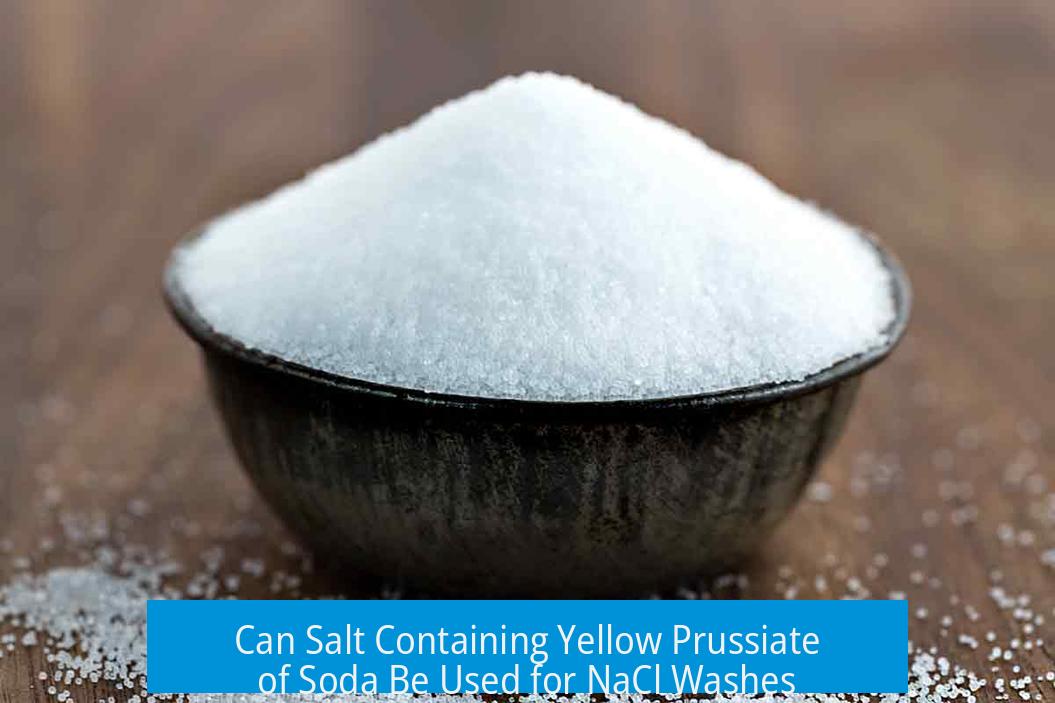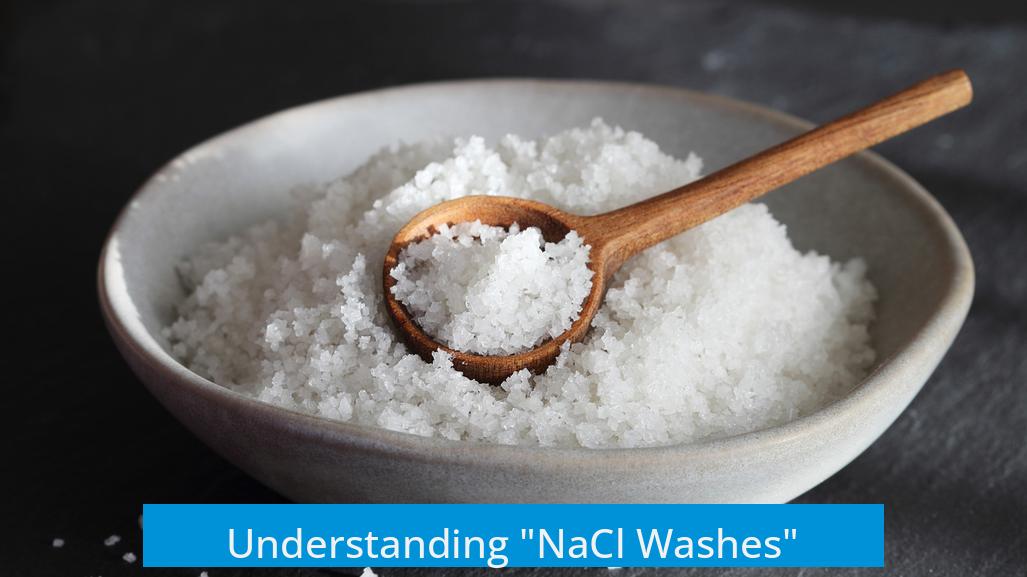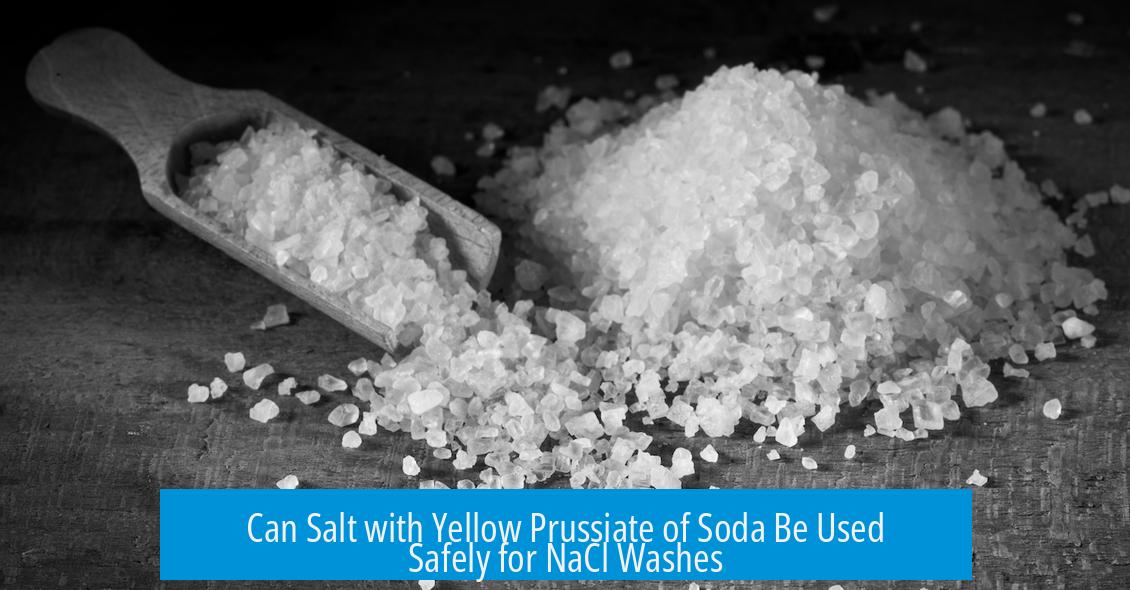Can Salt Containing Yellow Prussiate of Soda Be Used for NaCl Washes?

Salt containing yellow prussiate of soda (sodium prusside) as an anti-caking agent is generally not recommended for NaCl washes where high purity is essential. Its presence can interfere with chemical processes, especially in catalytic or metal-complex sensitive reactions. For non-critical applications, it may be acceptable, but better alternatives exist.
Understanding “NaCl Washes”

The term “NaCl washes” varies by field. In chemistry, it typically refers to washing a product or reaction mixture with aqueous sodium chloride to remove impurities or change solubility conditions. In biological or industrial contexts, it can mean slightly different processes but still involves sodium chloride solutions. Clarifying the exact wash purpose is vital before selecting salt.
Salt Purity and Source in NaCl Washes
Laboratory Grade vs. Table Salt
Laboratory-grade sodium chloride is usually very pure and free from contaminants. Table salt, although food grade, contains additives such as anticaking agents, which vary in chemical composition. These additives can introduce trace impurities that may affect sensitive chemical reactions.
For example, analytical reagent (AR) grade sodium chloride has minimal impurities and is preferred where reaction fidelity is important. Table salt may contain up to 2% or more non-NaCl material, including iodine, anti-caking agents, or other minerals. Experiments comparing AR grade and table salt for identical applications reveal differences in outcomes when sensitive compounds are involved.
Use of Table Salt in Laboratory Settings
Many university labs save costs by substituting table salt for reagent-grade NaCl. This approach is workable for routine or robust processes where minor impurities do not affect the outcome. However, the chemical nature of anti-caking agents in the salt should be verified to rule out interference, especially if working with complex compounds like metal porphyrins or catalysts.
Anti-Caking Agent: Yellow Prussiate of Soda
Chemical Nature and Effects
Yellow prussiate of soda refers to sodium prusside (Na2[Fe(CN)5NO]), an iron-containing complex used as an anti-caking agent in some salt preparations. Though only present in low amounts, this compound can interact chemically, particularly with metal complexes or catalytic systems.
- It can co-chelate with porphyrin compounds depending on the metal center.
- It may interfere with catalytic chemistry due to its iron content and complex nature.
- Presence of cyanide ligands in sodium prusside makes it reactive under some conditions.
These effects are rare but documented in specific sensitive chemical contexts. The additive’s interference is unlikely in straightforward washing steps but cannot be fully ruled out in delicate syntheses.
Practical Use Considerations
For basic, non-critical home chemistry or protocols where the salt’s chemical inertness is not essential, table salt with yellow prussiate of soda might be tolerated. It is advised not to employ such salt in reactions involving metal coordination chemistry or catalysts due to potential complications and unexpected byproducts.
Manufacturing your own sodium chloride by evaporating pure brine or further purifying salt before use avoids these issues. This process, while more involved, guarantees control over impurities.
Recommendations for Salt Selection in NaCl Washes
Preferred Salt Types
- Laboratory Grade Sodium Chloride: AR or reagent grade salts from chemical suppliers offer consistent purity and no interfering additives.
- Kosher Salt: Coarse kosher salt without iodine or anti-caking agents is often clean and economical.
- Sea Salt Without Additives: Some natural sea salts lack preservatives and anti-caking agents, making them suitable.
Cost-Effectiveness
Laboratory-grade sodium chloride can be affordable; typically under $20 per kg from chemical suppliers, cheaper if bought in bulk. Mortons Canning Salt, commonly available at about $1 per kg, is a food-grade product without certain additives, and many labs report good results with it.
Given this, paying a small premium for purity is worthwhile to avoid reaction issues caused by additives, especially when the reaction sensitivity is unknown.
Summary of Insights
- Yellow prussiate of soda in salt introduces iron-cyanide complexes that may co-chelate or interfere with delicate metal or catalytic chemistry.
- For critical NaCl washes related to chemical synthesis, avoid salt containing this additive to prevent unintended reactions.
- Table salt with yellow prussiate of soda may be acceptable for crude or non-sensitive wash steps but is generally not recommended.
- Use laboratory-grade NaCl, kosher salt without preservatives, or purified salts to ensure reproducible and clean outcomes.
- When purity matters, making or purifying the salt yourself eliminates additive interference completely.
- Rule of thumb: If the presence of an additive prompts doubt about compatibility, err on the side of caution and select purer salt.





Leave a Comment